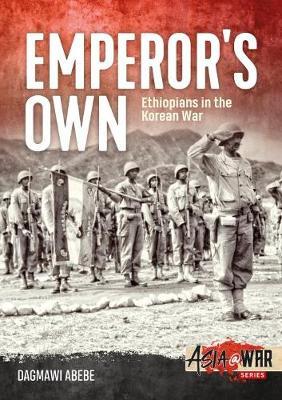Emperor'S Own

Emperor'S Own
In response to North Korea's invasion of South Korea, the United Nations sent an urgent plea to its members for military assistance. Sixteen nations answered the call by contributing combat troops. Ethiopian Emperor Haile Selassie, a stalwart advocate of collective security, dispatched an infantry battalion composed of his Imperial Bodyguard to affirm this principle which had been abandoned in favour of appeasement when the League of Nations (the predecessor to the United Nations) gave Fascist Italy a free-hand to invade Ethiopia in 1935.
The unit designated "Kagnew Battalion" was actually successive battalions which rotated yearly and fought as part of the US 32nd Infantry Regiment, 7th Infantry Division. When they arrived, these warriors from an ancient empire were viewed with suspicion by their American allies as they were untested in modern warfare. Their arrival in Korea also coincided with the de-segregation of the US Army.
However, the Ethiopians eventually earned the respect of their comrades after countless bloody, often hand-to hand battles, with all three battalions which served during the war earning US Presidential Unit Citations. Remarkably, Kagnew was the only UN contingent which did not lose a single man as prisoner of war or missing in action.
Until now, few have heard the story of their stand for collective security and against aggression. The Emperor's Own provides insight into who these men and women were as well as what became of them after the war.
PRP: 143.64 Lei
Acesta este Prețul Recomandat de Producător. Prețul de vânzare al produsului este afișat mai jos.
129.28Lei
129.28Lei
143.64 LeiLivrare in 2-4 saptamani
Descrierea produsului
In response to North Korea's invasion of South Korea, the United Nations sent an urgent plea to its members for military assistance. Sixteen nations answered the call by contributing combat troops. Ethiopian Emperor Haile Selassie, a stalwart advocate of collective security, dispatched an infantry battalion composed of his Imperial Bodyguard to affirm this principle which had been abandoned in favour of appeasement when the League of Nations (the predecessor to the United Nations) gave Fascist Italy a free-hand to invade Ethiopia in 1935.
The unit designated "Kagnew Battalion" was actually successive battalions which rotated yearly and fought as part of the US 32nd Infantry Regiment, 7th Infantry Division. When they arrived, these warriors from an ancient empire were viewed with suspicion by their American allies as they were untested in modern warfare. Their arrival in Korea also coincided with the de-segregation of the US Army.
However, the Ethiopians eventually earned the respect of their comrades after countless bloody, often hand-to hand battles, with all three battalions which served during the war earning US Presidential Unit Citations. Remarkably, Kagnew was the only UN contingent which did not lose a single man as prisoner of war or missing in action.
Until now, few have heard the story of their stand for collective security and against aggression. The Emperor's Own provides insight into who these men and women were as well as what became of them after the war.
Detaliile produsului










